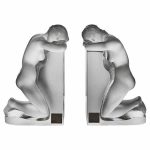Dear Lee,
We always have had trouble spelling, but with computer spell-checks it would seem impossible to make too many errors. Not so. Online auctions, letters from readers, and even signs in shops show that errors abound. “I have a silver bowel [bowl]” is a common-and hilarious-misspelling. But other words like Wedgewood [Wedgwood], peuter [pewter], boot scrappers [scrapers], quilt [gilt] mirror, chandaleer [chandelier], Limoge [Limoges], and even antiks [antiques] are just a few. Errors are not only embarrassing, but costly; your antique won’t sell online if an important word in your ad is spelled incorrectly.
The special words used to describe antiques and collectibles are another problem. Why does a catalog use the word “vessel” to describe what is obviously a vase? Why do the English describe a silver piece as “plate” when it’s sterling silver, while we say “plated” when referring to a piece that’s only covered with silver? Why is a “davenport” a sofa in the United States, but a desk in England? And how confusing that an English cann or can is like an American mug, and an American can is a sealed container for food. Sometimes a word has two meanings: to a silversmith, “chasing” is a type of pounded decoration; to the rest of us, it’s part of a race. More word problems: Why do we say we “won it” at an auction when, actually, we bought it? Why do we say we “stole it” when we mean we got it for a cheap price? And why are recent price books published in England but sold here full of unfamiliar terms like “elbow chair” (an armchair that is part of a dining room set) or “flatware” (meaning plates)? It is all very confusing. But names don’t change the look or value or the “I-must-have-it” attraction of a collectible. Just enjoy the humor in errors and the differences in vocabulary.




Leave a Reply
You must be logged in to post a comment.